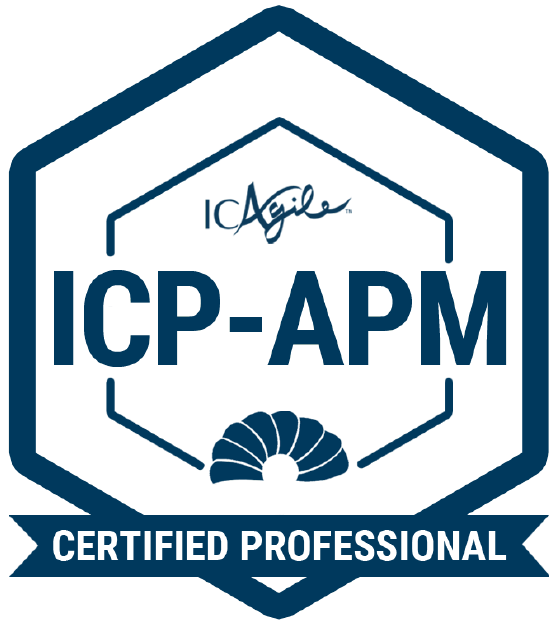Overview
In this Agile Project Management training course, you will learn project management skills to help you, the servant leader of your Agile teams, enable your team(s) to deliver what your customers want faster and with better quality than ever before! This is an in-depth course for those who are already familiar with agile methodologies who wish to take their skills in Project Management for Agile Teams to the next level. All of the Agile Project Management practices in this course are documented and cross-referenced as part of the course materials — allowing you to continue your study after the course!
This Agile Project Management workshop is based on leading-edge tools and techniques from many of those at the forefront of the introduction of Agile and current thought leaders in the industry today. Every Cprime instructor has been “in the trenches” as an Agile Project Manager and Coach of Agile teams. Each instructor brings real-life experience to teach and guide participants during the delivery of this course.
This course meets the requirements for the ICP-APM designation (ICAgile Certified Professional in Agile Project and Delivery Management). Attendees who successfully complete the class will be awarded the ICP-APM certification. *Please note, the eLearning course does not provide attendees with ICAgile certification.

Successfully complete an ICAgile accredited course taught by an ICAgile Authorized Instructor.
ICAgile Authorized Instructor can withhold certifications based on lack of participation or understanding of course learning outcomes.
GSA: $1185 USD
14 PDUs
Next Upcoming Course


Train up your teams with private group training
Have a group of 5 or more students? Cprime also provides specialist private training with exclusive discounts for tailored, high-impact learning.
ICAgile Project Management (ICP-APM) Schedule
Full Course Details
Part 1: The History of Agile
- Principles of Lean
- Traditional vs Agile Planning
- Benefits of an Agile Approach
Part 2: Agile Principles and Mindset
- Agile Manifesto
- Agile Delivery
- Scrum Framework
- Scaling Agile
Part 3: Reality of Agile Projects
- Defining Successful Projects
- Agile Project Management
Part 4: Agile Delivery Management
- Historical Business Landscape
- Value Streams
- Product Delivery Organization Model
- Developing Team Members and Managing Resources
- Elements of Servant Leadership
Part 5: Optimization
- Waterfall Iron Triangle
- Learn How to Leverage your Plan to Deliver Quality and Value
- Learn How Much to Invest Up Front
- Managing the Flow
- Team Effectiveness: Project Metrics
Part 6: Agile Governance and Contracting
- Compliance Types
- Lean Agile Procurement (LAP)
Part 7: Team Empowerment
- What it takes to Empower
- Trust Dimensions
- Team Dysfunctions
- Levels of Authority
Part 8: Identifying and Communicating Value
- Business Model Canvas
- Product Backlog and Refinement
- Calculating Business Value
- Validating Value Delivery
Hands-on Exercises
Class Exercise 1
In this exercise, we will discuss the project team in today’s environment and the impact that knowledge work has had on the development industry. Views from Drucker and select studies from leading industry whitepapers will be discussed to help you gain an understanding of and how to work with development teams in complex environments.
Class Exercise 2
In this exercise, participants will investigate project uncertainty and discuss specific techniques to not only mitigate risk — but to leverage it! We will look at different ways to view constraints and tradeoffs to share them with the stakeholder.
Additionally, we will review different approaches the Agile Project Manager can take to mitigate risk when dealing with budget, vendors, and contracts.
Class Exercise 3
The case studies and discussion exercises in this section help the Agile Project manager understand the difference between diagnostic and performance metrics and how to utilize metrics in an Agile Framework. Participants will discuss how understanding these types of metrics, applied to the individual, team, and project will help the Agile Project Manager guide both the team and the project in the daily work environment.
Class Exercise 4
The exercises in this section will provide participants with an overall view of how to establish empowered teams quickly based on the organization of roles. Exercises are designed to create an understanding of team dynamics. In addition, case studies are used to examine the differences between Agile teams and traditional teams. We will discuss a set of Agile project management “tools” which teams can use as they work towards becoming a high performing team. Additional exercises in this section cover trust and the three steps of rebuilding trust as well as conflict and conflict resolution and how the Agile project manager can help the team to develop trust and resolve conflict as it arises. A final, interactive exercise for this section will challenge the participants to put all of these tools and topics in place and work as a team to meet the exercise objective.
Class Exercise 5
In these sections, the exercises will help the Agile PM focus on the delivery of value and achieving customer/stakeholder satisfaction. We will discuss theory and show the use of feedback loops in the value cycle and discuss as a group how techniques like “trimming the tail” can be used to assist the team and stakeholder.
A highly interactive team exercise will be used to teach participants the concepts of continual planning and re-estimation of how and why to make these plans visible to the organization.
Class Exercise 6
The objective of the exercises in this section is to understand the importance of and how to create stakeholder involvement in our projects. As a “live case study,” teams will create an Agile “communication plan” and then, as a group, we will discuss the options for communication and collaboration which an Agile project manager can utilize to create transparency and help create team success.
This Agile Project Management training course is designed for anyone who is considering the use of an Agile methodology for software development.
Professionals who may benefit include:
- Project Managers
- Analysts
- Developers
- Programmers
- Testers
- IT Managers/Directors
- Software Engineers
- Software Architects
- Software Managers
- Testing Managers
- Team Leaders
- Customers/Stakeholders
- Product Owners/Product Management
- Acquire valuable insights into how you can build trust and “empower and inspire” your Agile team
- Gain insight on how to establish transparency in communication inside the team as well as with customers
- Develop teams into high-performance Agile teams
- Gain powerful Agile Project Management skills using Agile estimating techniques that will allow you to derive estimates quickly and more accurately and aid you in iteration and release planning
- Combine the best methods from multiple Agile Project Management methods to apply to your Agile team
- Establish a plan for incorporating Agile Project Management practices into your specific work area
- Successfully coach a new or existing Agile team
- Establish and communicate appropriate expectations
Although there is not an ICAgile official exam, ICAgile allows for their course accreditors to determine appropriate means for retention of the learning outcomes. Depending on your provider, there may be some type of assessment in order to earn certification.
Many providers assess via participation, activity and understanding conveyed via exercises and discussion, withholding certification when appropriate.
Great supplement to the PMP certification!
Really enjoyed the discussions and the content was relevant
This course was very insightful. There were a lot of takeaways from the course that I can apply to my daily work.

The training was excellent. The content was relevant and the Instructor delivered well. The reference material will be useful for reinforcement.
-Janice B.